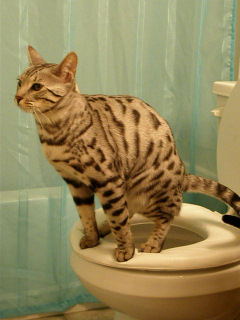Never Flush Cat Poop Down Your Toilet - Safeguard Your Plumbing Infrastructure
Never Flush Cat Poop Down Your Toilet - Safeguard Your Plumbing Infrastructure
Blog Article
On this page in the next paragraph you'll find a bunch of wonderful information and facts all about Don’t flush cat feces down the toilet.

Introduction
As cat proprietors, it's important to bear in mind just how we take care of our feline buddies' waste. While it might appear convenient to purge pet cat poop down the bathroom, this practice can have destructive consequences for both the environment and human health.
Alternatives to Flushing
The good news is, there are much safer and extra liable methods to deal with feline poop. Think about the complying with choices:
1. Scoop and Dispose in Trash
One of the most typical method of throwing away pet cat poop is to scoop it into a biodegradable bag and throw it in the trash. Be sure to use a committed trash scoop and get rid of the waste quickly.
2. Usage Biodegradable Litter
Select biodegradable cat clutter made from materials such as corn or wheat. These clutters are environmentally friendly and can be safely disposed of in the trash.
3. Hide in the Yard
If you have a yard, think about hiding cat waste in a designated location far from vegetable yards and water resources. Be sure to dig deep adequate to stop contamination of groundwater.
4. Set Up a Pet Waste Disposal System
Buy a pet garbage disposal system specifically developed for pet cat waste. These systems use enzymes to break down the waste, lowering smell and ecological influence.
Health and wellness Risks
In addition to ecological problems, purging pet cat waste can also present wellness threats to human beings. Cat feces might have Toxoplasma gondii, a parasite that can create toxoplasmosis-- a potentially extreme disease, especially for expectant females and people with damaged body immune systems.
Environmental Impact
Flushing cat poop introduces hazardous microorganisms and bloodsuckers right into the water supply, presenting a considerable threat to water ecological communities. These impurities can adversely influence aquatic life and compromise water high quality.
Final thought
Accountable animal ownership extends beyond providing food and sanctuary-- it additionally entails correct waste monitoring. By avoiding purging pet cat poop down the bathroom and going with alternative disposal approaches, we can decrease our ecological impact and safeguard human health.
Why You Should Never Flush Cat Poop Down the Toilet
A rose by any other name might smell as sweet, but not all poop is created equal. Toilets, and our sewage systems, are designed for human excrement, not animal waste. It might seem like it couldn’t hurt to toss cat feces into the loo, but it’s not a good idea to flush cat poop in the toilet.
First and foremost, assuming your cat uses a litter box, any waste is going to have litter on it. And even the smallest amount of litter can wreak havoc on plumbing.
Over time, small amounts build up, filling up your septic system. Most litter sold today is clumping; it is made from a type of clay that hardens when it gets wet. Ever tried to scrape old clumps from the bottom of a litter box? You know just how cement-hard it can get!
Now imagine just a small clump of that stuck in your pipes. A simple de-clogger like Drano isn’t going to cut it. And that means it’s going to cost you big time to fix it.
Parasitic Contamination
Believe it or not, your healthy kitty may be harboring a nasty parasite. Only cats excrete Toxoplasma in their feces. Yet it rarely causes serious health issues in the cats that are infected. Most people will be fine too if infected. Only pregnant women and people with compromised immune systems are at risk. (If you’ve ever heard how women who are expecting are excused from litter cleaning duty, Toxoplasma is why.)
But other animals may have a problem if infected with the parasite. And human water treatment systems aren’t designed to handle it. As a result, the systems don’t remove the parasite before discharging wastewater into local waterways. Fish, shellfish, and other marine life — otters in particular — are susceptible to toxoplasma. If exposed, most will end up with brain damage and many will die.
Depending on the species of fish, they may end up on someone’s fish hook and, ultimately on someone’s dinner plate. If that someone has a chronic illness, they’re at risk.
Skip the Toilet Training
We know there are folks out there who like to toilet train their cats. And we give them props, it takes a lot of work. But thanks to the toxoplasma, it’s not a good idea.

As a keen person who reads on Don’t flush cat feces down the toilet, I figured sharing that post was really helpful. Sharing is good. You won't know, you may just be helping someone out. Many thanks for your time spent reading it.
View Website Report this page